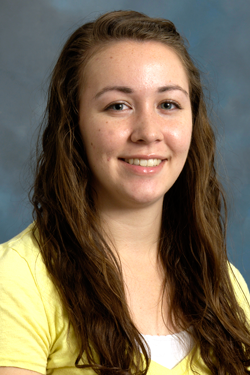Arnold School researchers delve into health news from consumers' perspective and from the view of journalists
June 10, 2011
 Eleasa Van Slooten, a Magellan Scholar, is
Eleasa Van Slooten, a Magellan Scholar, is
studying consumers' sources of health news.
Arnold School of Public Health researchers are working on two health communication studies, including one that is probing consumers' thoughts about health resources on Columbia area television websites.
The other, which involves a collaboration between faculty from USC's Arnold School of Public Health and the School of Journalism and Mass Communications, will involve interviews with health journalists from around the country on the readability of online health news and TV reporters' coverage of critical health issues in an increasingly multimedia environment.
The Columbia area study is the brainchild of Eleasa Van Slooten, an Arnold School undergraduate student whose research is supported by a grant from the USC Magellan Scholarship program.
Dr. Daniela Friedman, of the Arnold School's Department of Health Promotion, Education, and Behavior, and Dr. Andrea Tanner, of the School of Journalism and Mass Communications, are Van Slooten's mentors for the year-long project.
"Local television news is a primary source of health information and has the power to raise initial public awareness about a health issue," said Friedman.
Van Slooten has begun advertising for study volunteers. The study seeks men and women, between the ages 35 to 49, who 1) get their health news mainly or solely from the Internet or 2) from both the Internet and other media sources, such as newspapers, TV, and magazines.
Volunteers will be asked to participate in one 1.5-hour discussion group and complete two brief surveys. In appreciation for their time, participants will receive a $15 gift card.
In applying for the study, Van Slooten said she wanted to assess consumers' preferred information sources for health news.
She also wants to determine consumer perceptions about using the Internet for health information, consumer opinions about health news on local TV websites, and consumer comprehension of health content on TV news websites.
"Findings from this research will help in future development and dissemination of clear and tailored media messages about health that will increase awareness and healthy behaviors among media audiences," said Van Slooten.
In their national study, Friedman and Tanner are surveying some 20 TV journalists in selected markets on how they handle public health information.
"From a public health standpoint, we are trying to determine if TV journalists have training in health and risk communications. We also want to know if they consider the literacy level of consumers when they're pulling together their news stories," said Friedman.
The researchers want to explore the decision-making process that goes into coverage.
"We also want to know why television journalists cover certain health-related issues," Tanner said. "We're focusing on the internal and external factors that may influence journalists' decision-making when developing story ideas related to health."
To volunteer for the Columbia area study, call or click:
- Eleasa Van Slooten, 864-421-3294 or vansloot@email.sc.edu.
- Daniela Friedman, 803-777-9933 or mailto:dbfriedman@sc.edu



_01.jpg)
_02.jpg)